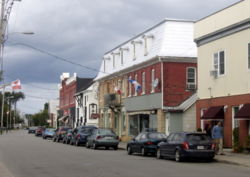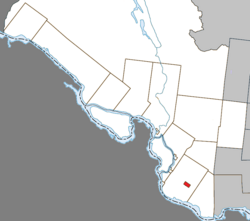Shawville, Quebec
Shawville | |
|---|---|
 Shawville main street | |
 Location within Pontiac RCM | |
| Coordinates: 45°36′N 76°29′W / 45.600°N 76.483°W[1] | |
| Country | |
| Province | |
| Region | Outaouais |
| RCM | Pontiac |
| Constituted | January 1, 1874 |
| Government | |
| • Mayor | Sandra Murray |
| • Federal riding | Pontiac |
| • Prov. riding | Pontiac |
| Area | |
| • Total | 5.40 km2 (2.08 sq mi) |
| • Land | 5.39 km2 (2.08 sq mi) |
| Population (2016)[3] | |
| • Total | 1,587 |
| • Density | 294.5/km2 (763/sq mi) |
| • Pop 2011-2016 | |
| • Dwellings | 735 |
| Time zone | UTC−5 (EST) |
| • Summer (DST) | UTC−4 (EDT) |
| Postal code(s) | |
| Area code | 819 |
| Highways | |
| Website | www |
Shawville is a town located in the Pontiac Regional County Municipality in the administrative region of Outaouais in western Quebec, Canada.
History
At the end of the 1860s, a group of citizens from Clarendon Centre, under the leadership of James Shaw (1818-1877), separated the municipality from the township of Clarendon. While they had originally planned on naming the new entity "Daggville," after the name of a pioneer family, they opted instead to name it "Shawville" after James Shaw promised to donate 0.8 ha of land to the new municipality. Shawville was officially established in 1874 and was populated by Irish Protestant immigrants. Shaw, who had settled in the area in 1843, was the first mayor, serving from 1856 to 1877.
The municipality has a Methodist church that was built in Shawville in 1835, while the Catholic Parish of Saint-Alexandre-de-Clarendon opened its doors in 1840. This church would later be renamed as Sainte-Mélanie, and still later as Saint-Jacques-le-Majeur in 1917.[1]
In recent times, Shawville has been the site of several conflicts between local shopkeepers and the Office québécois de la langue française over the province's language laws.[4]
Geography
The town is completely enclosed within the municipality of Clarendon. Shawville is situated approximately 75 kilometres (47 mi) west of Gatineau and 35 kilometres (22 mi) southeast of Fort-Coulonge.
Demographics
Population
| 2016 | 2011 | |
|---|---|---|
| Population | 1,587 (-4.6% from 2011) | 1,664 (+4.9% from 2006) |
| Land area | 5.39 km2 (2.08 sq mi) | 5.40 km2 (2.08 sq mi) |
| Population density | 294.5/km2 (763/sq mi) | 308.1/km2 (798/sq mi) |
| Median age | 50.1 (M: 46.6, F: 52.4) | 50.8 (M: 48.0, F: 53.2) |
| Private dwellings | 735 (total) | 775 (total) |
| Median household income | $47,403 | $43,575 |
| Year | Pop. | ±% |
|---|---|---|
| 1986 | 1,575 | — |
| 1991 | 1,591 | +1.0% |
| 1996 | 1,632 | +2.6% |
| 2001 | 1,582 | −3.1% |
| 2006 | 1,587 | +0.3% |
| 2011 | 1,664 | +4.9% |
| 2016 | 1,587 | −4.6% |
| Source: [9] | ||
Language
Shawville is an overwhelmingly anglophone (with 85 percent of its residents listing English as their first language in the Canada 2006 Census) and Protestant (75%) community.[7] This is unusual in Quebec, a province that is overwhelmingly French-speaking and Roman Catholic. The population has been known to quite literally run the so-called "language police" "out of town"[10] in defiance of the Charter of the French Language.
| Language | Population | Pct (%) |
|---|---|---|
| English | 1,285 | 85.4% |
| French | 180 | 12.0% |
| English and French | 15 | 1.0% |
| Other languages | 25 | 1.7% |
Culture
The town is characterized by its red-brick buildings, and unlike nearly every other municipality in Quebec, it has no Catholic church. Shawville is home to an elementary school, a high school, a regional hospital, and the SRPC national head office. Its businesses are mostly small and family-run.
The Shawville Fair, held the first weekend in September, is the town's major event. It has run every year since 1856 and includes typical county fair features such as livestock shows, auctions, truck pulls, demolition derbies, art/craft/hobby shows, diverse food stands and a midway. In recent years, it has drawn headline entertainers such as Terri Clark, Stompin' Tom Connors, Paul Brandt, April Wine, Dean Brody and Corb Lund, with total attendance reaching around 50,000. It will not run for the first time in its history in 2020, amid fears of Covid-19.
Sports
Shawville is represented in the Eastern Ontario Junior B Hockey League by the Shawville Pontiacs.
Notable people
Famous people from Shawville include the former general manager of the Ottawa Senators, Bryan Murray, Terry Murray (current assistant coach of the Buffalo Sabres and former coach of the L.A. Kings), Tim Murray (former general manager of the Buffalo Sabres), NHL legend Frank "The Shawville Express" Finnigan and race horse owner and lawyer Clay Horner. Former NHL referee Blaine Angus also comes from the area. Ray Harris, a prominent singer-songwriter in the Ottawa area, was raised in Shawville and later wrote the song Shawville Girl. In addition to this, former Canadian Prime Minister Joe Clark has a residence on Main Street and volunteers at the annual fair.[11]
See also
References
- ^ a b "Shawville (Municipalité)" (in French). Commission de toponymie du Québec. Retrieved 2012-04-02.
- ^ a b "Shawville". Répertoire des municipalités (in French). Ministère des Affaires municipales, des Régions et de l'Occupation du territoire. Retrieved 2011-06-22.
- ^ a b c "Shawville, Quebec (Code 2484010) Census Profile". 2016 census. Government of Canada - Statistics Canada.
- ^ "'Shawville posse' language incident goes to court". CBC.ca. 19 December 2003. Retrieved 26 March 2017.
- ^ "2016 Community Profiles". 2016 Canadian census. Statistics Canada. August 12, 2021. Retrieved 2019-11-22.
- ^ "2011 Community Profiles". 2011 Canadian census. Statistics Canada. March 21, 2019. Retrieved 2014-01-28.
- ^ a b "2006 Community Profiles". 2006 Canadian census. Statistics Canada. August 20, 2019.
- ^ "2001 Community Profiles". 2001 Canadian census. Statistics Canada. July 18, 2021.
- ^ Statistics Canada: 1996, 2001, 2006, 2011 census
- ^ http://vigile.quebec/archives/996/shawville.html
- ^ Harris, Ray. "Shawville Girl". Bandcamp. Retrieved 20 January 2017.

